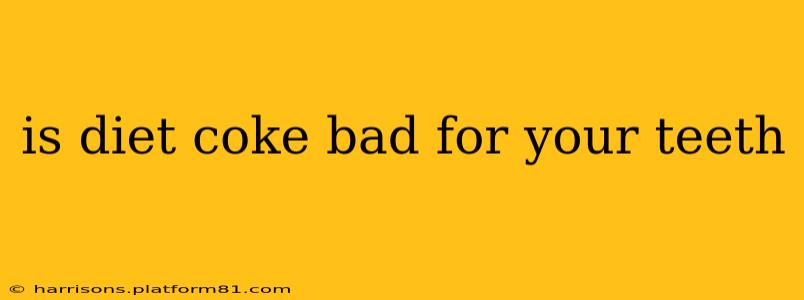Diet Coke, and diet sodas in general, are marketed as a healthier alternative to their sugary counterparts. But are they truly harmless to your pearly whites? The short answer is: it's complicated. While they lack the sugar that fuels cavity-causing bacteria, diet sodas possess other properties that can negatively impact dental health. This article will delve into the science behind the effects of Diet Coke on your teeth, answering your burning questions.
Does Diet Coke Cause Tooth Decay?
While Diet Coke doesn't contain sugar, a primary culprit in tooth decay, it's not entirely innocent. The acidity of Diet Coke, primarily from phosphoric acid, is the main concern. This acid erodes tooth enamel, the protective outer layer of your teeth. Repeated exposure to acidic drinks weakens enamel, making teeth more susceptible to cavities and increased sensitivity.
Is Diet Coke Worse Than Regular Coke for Your Teeth?
This is a question many people ask. While regular Coke's high sugar content directly feeds bacteria, leading to acid production and cavities, Diet Coke's acidity attacks the enamel directly. The comparison is complex. Regular Coke may lead to more cavities in the long run due to the sugar, but Diet Coke's acidity can cause enamel erosion and increased sensitivity more rapidly. The "worse" option depends on individual factors and consumption habits.
How Does Diet Coke Affect Tooth Enamel?
The high acidity of Diet Coke (and other diet sodas) lowers the pH in your mouth. This acidic environment dissolves the minerals in your tooth enamel, leading to enamel erosion. This erosion can manifest as increased tooth sensitivity, visible pitting or wearing away of the enamel, and ultimately, increased susceptibility to cavities. The more frequently you consume Diet Coke, the greater the risk of enamel erosion.
What Are the Long-Term Effects of Drinking Diet Coke on Teeth?
Chronic consumption of Diet Coke can lead to several long-term dental problems:
- Increased Tooth Sensitivity: Enamel erosion exposes the dentin, the layer beneath enamel, which contains nerve endings. This leads to heightened sensitivity to hot, cold, sweet, or sour foods and drinks.
- Tooth Decay: While Diet Coke doesn't cause decay directly, the weakened enamel makes teeth more vulnerable to bacterial attack and cavity formation.
- Dental Staining: Although it doesn't contain sugar, the acidity can etch the surface of your teeth, making them more prone to staining from other substances.
- Chipping and Cracking: Weakened enamel is more likely to chip or crack, requiring dental repair.
Can I Still Drink Diet Coke Occasionally?
Moderation is key. Occasional consumption of Diet Coke is unlikely to cause significant damage. However, frequent consumption, especially throughout the day, significantly increases the risk of enamel erosion and other dental problems.
What Can I Do to Minimize the Damage?
If you enjoy Diet Coke, consider these tips to minimize its impact on your teeth:
- Limit your intake: Try to restrict your consumption to a single serving, or less, per day.
- Use a straw: Drinking through a straw minimizes contact between the soda and your teeth.
- Rinse your mouth with water: After consuming Diet Coke, rinse your mouth with water to neutralize the acid.
- Wait to brush your teeth: Brush your teeth immediately after drinking acidic drinks can damage your enamel further. Wait at least 30 minutes before brushing.
- Maintain good oral hygiene: Brush and floss regularly, and visit your dentist for regular checkups and cleanings.
By understanding the potential negative effects of Diet Coke on your teeth and adopting preventative measures, you can enjoy your favorite beverage responsibly while maintaining optimal oral health. Remember, consulting your dentist is crucial for personalized advice tailored to your individual needs and dental health.
